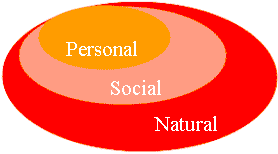 |
||
|
|
||
|
|
||
|
|
 |
||
|
|
||
|
|
||
|
|
The locus of literary meaning has variously been taken to be the author's intention, the reader's response, and the text itself (cf. Hernadi 1995). In a cognitive perspective, it makes little sense to locate the kind of meaning accessible to human readers exclusively in the text itself, since the very act of abstracting the text as an isolable object is dependent on a cognitive act of framing. To speak about a text is already to place it in the human world; to access its symbolic meaning is possible only through a series of complex cognitive acts.
The meaning that should properly be attributed to the author, however, cannot be equated with his conscious intentions; since major aspects of meaning-making are cognitively impenetrable, the author can never have conscious or reflective knowledge of the full complexity of what he is communicating. An analysis of meaning focusing on the author may consider several different interacting levels of creativity and constraints, and these will not be exhaustible.
Since the reader, just as the writer, depends on multilayered interpretive processes that are far from cognitively transparent, the complexity of the reader's response will also be a significant factor of interest. In the normal course of things, the use of a text--readers' interpretations--may become more significant than the author's meaning, when persistent misreadings, or simply emphases or biases, take on their own cultural life.
Within these two sets of cognitive acts, the fictional world can emerge--a framed world to which is applied the whole range of inferences that apply to the real world.
In sum, literary meaning may be seen to involve accepting the perspective
of the fictional world (suspending disbelief), making hypotheses about
the author's intentions (not in principle any less knowable than any other
object of knowledge), and about relevant readers' responses--including
one's own (this is no more than what any author does as a matter of course).
These perspectives in turn map onto three broad modes of construal: the personal, the socio-historical, and the natural, rougly nested. The personal is the domain of folk psychology, a rich mode of construal that gain us initial access to the text; the socio-historical contextualizes the personal in the domain of cumulative cultural information; the natural further situates the personal and the cultural in cognitive structures that emerge out of the semiotic processes of life. The current disregard for the cognitive or natural dimension leads to a failure to appreciate the major themes of literature, and thus quite frequently to a denial of the meanings that is still available to the naive reader. Cognitive Culture Theory should be utilized to deepen the understanding reached by folk psychology and historical research, as a complement to rather than a substitute for current work. Since the claims of cultural constructionism tend to be totalizing, however, the cognitive approach may serve as a corrective.
The third dimension is given by three central concerns of literary understanding,
the meaning, the method, and the motive:
|
|
|
|
|
|
|
|
|
|
|
|||
|---|---|---|---|
| UP |
|
|
|
| Meaning | What are the personal histories that explain behavior in the the fictional world? | What are the social forces that act in the fictional world? | What are the cognitive faculties invoked to explain the fictional world? |
| Method | What personal resources are provided the fictional characters? | How are these personal resources situated within the cultural capital of the fictional world? | How are the personal resouces and cultural captial related to claims about human nature? |
| Motive | What are the personal motives of the fictional characters? | What are the coalitional or other social forces that determine their behavior? | What is the role of human nature in personal and social motivations? |
|
|
|||
|---|---|---|---|
| UP |
|
|
|
| Meaning | What are the real biographical elements that shaped the fictional world? | What are the real historical forces that generated this particular fictional world? | What are the real prehistorical (natural) forces that enabled and shaped the fictional world? |
| Method | How does the author convey what s/he means? | What are the historically developed tools that permitted this creation? | What are the cognitive structures (input conditions, conceptual primitives, inference engines, categories) that permit this creation? |
| Motive | Why is the author interested in this meaning? | What are the coalitional or other social forces that determined the formulation of the work? | What are the evolutionarily significant problems raised in the fictional work, and how are they raised? |
|
|
|||
|---|---|---|---|
| UP |
|
|
|
| Meaning | What is the reader's personal interpretation of the text? | What are the cultural factors that predispose readers to a particular interpretation? | What are the local calibrations of the cognitive faculties that generate the interpretation? |
| Method | What are the strategies of reading used to arrive at an interpretation? | What are the culturally developed tools that permit the reader to access the text? | What are the cognitive structures (input conditions, conceptual primitives, inference engines, categories) that permit this the interpretation? |
| Motive | Why is the reader personally interested in the meaning of the fictional work? | What are the coalitional interests and social ambitions that determine the interpretation? | How are the evolutionarily significant problems raised specifically relevant to the reader? |
 |
||
|
|
||
|
|